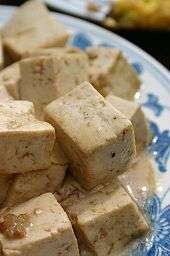High-protein diet
A high-protein diet is low in fat or carbohydrate consumption, and is not the same as a low-carbohydrate diet which may not be food-energy–controlled and may include fat. Example foods in a high-protein diet include lean beef, chicken or poultry, pork, salmon and tuna, eggs, and soy.[1] A diet is considered "high in protein" if daily protein consumption exceeds 15% of total energy intake.[2]

Health effects
The diet has been described by nutritionists as unhealthy and unbalanced.[3]
High protein intake on the order of 200 g per day, coupled with inadequate intake of other calorie sources (fat or carbohydrates), can cause a form of metabolic disturbance and death commonly known as rabbit starvation. Even when consuming other calorie sources, consuming more than 285 g of protein per day (for an 80 kg person) may be unsafe.[4]
Relatively little evidence has been gathered regarding the effect of more moderate long-term high intake of protein on the development of chronic diseases.[5] Increased load on the kidney is a result of an increase in reabsorption of NaCl. This causes a decrease in the sensitivity of tubuloglomerular feedback, which, in turn, results to an increased glomerular filtration rate. This increases pressure in glomerular capillaries.[6] When added to any additional renal disease, it may cause permanent kidney damage. A 2017 review paper in The New England Journal of Medicine suggests that high protein diet may contribute to life-long risk of kidney damage including chronic kidney disease.[7]
Legumes and nuts provide dietary fiber, which meat lacks.[8]
Sports training
While elevated amounts of protein consumption are beneficial during athletic training, particularly when attempting to gain muscular mass and strength, there is little evidence of any benefit from increasing protein intake above 2 g/kg bodyweight/day.[9]
See also
| Wikibooks Cookbook has a recipe/module on |
- Bodybuilding supplement
- Dietary supplement
- Dukan Diet
- Human nutrition
- List of diets
- Low-protein diet
- Nutrition
Notes
References
- "High-Protein Diets: Do They Work?". WebMD. 8 October 2018. Retrieved 18 November 2018.
- Pesta DH, Samuel VT (2014). "A high-protein diet for reducing body fat: mechanisms and possible caveats". Nutrition and Metabolism (London). 11 (1): 53. doi:10.1186/1743-7075-11-53. PMC 4258944. PMID 25489333.
- Longe, Jacqueline L. (2008). The Gale Encyclopedia of Diets: A Guide to Health and Nutrition. Gale. p. 526. ISBN 978-1-4144-2991-5 "Nutritionists find high protein diets, especially high protein, high fat, severely carbohydrate restricted diets, to be unhealthy, unbalanced and generally unnecessary because of the well-documented risks."
- Bilsborough, Shane; Mann, Niel (April 2006). "A review of issues of dietary protein intake in humans" (PDF). International Journal of Sport Nutrition and Exercise Metabolism. 16 (2): 129–52. doi:10.1123/ijsnem.16.2.129. PMID 16779921. Retrieved 8 August 2013.
- "Protein: Moving Closer to Center Stage". Harvard School of Public Health. Retrieved 8 August 2013.
- Walter F., PhD. Boron (2005). Medical Physiology: A Cellular And Molecular Approach. Elsevier/Saunders. p. 771. ISBN 978-1-4160-2328-9.
- Kalantar-Zadeh K, Fouque D (2 November 2017). "Nutritional management of chronic kidney disease". N. Engl. J. Med. 377 (18): 1765–1776. doi:10.1056/NEJMra1700312. PMID 29091561.
- "High-Protein Diet for Weight Loss". WebMD Medical Reference. 5 November 2016.
- Tipton, K. D.; Wolfe, R. R. (2004). "Protein and amino acids for athletes". Journal of Sports Sciences. 22 (1): 65–79. doi:10.1080/0264041031000140554. PMID 14971434.